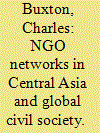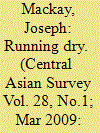| Srl | Item |
| 1 |
ID:
087680


|
|
|
|
|
| Publication |
2009.
|
| Summary/Abstract |
The article offers a review of centre-periphery relations and local politics in the Afghan province of Badakhshan from the 1980s to the post-2001 era. It maps the local powerbrokers and charts the transformations that occurred during this period, with particular reference to the impact of the central government's policies on local political alignments and relations of power. The key argument is that President Karzai's and the cabinet's behaviour towards Badakhshani politics was aimed at re-establishing a patrimonial system, rather than at institution-building as claimed. Unable or unwilling to successfully deal with established local players, Kabul resorted to sponsoring new players in local politics and facilitating their rise in order to weaken more independent powerbrokers. However, a local perception of weakness in Kabul, not least due to uncertainty over the durability of the Karzai administration, led local players, old and new, to behave with very short-term horizons, as 'roving bandits' rather than as 'stationary' ones.
|
|
|
|
|
|
|
|
|
|
|
|
|
|
|
|
| 2 |
ID:
087682


|
|
|
|
|
| Publication |
2009.
|
| Summary/Abstract |
After the collapse of the Soviet Union, school enrolment, attendance and attainment rates fell across the region. In Tajikistan, there has been a decrease in average completion rates for basic, secondary and higher education, as well as a growing gender gap because girls are much less likely than boys to finish all levels of schooling. Past work on educational stratification in the region has demonstrated similar trends, but not sought to explain the processes generating these patterns. Scholars of educational participation suggest that a variety of family, community and macro-structural factors influence educational attainment. This paper broadens our understanding of the processes generating the decline in educational attainment and widening gender gap by analysing interviews conducted with parents, teachers and university students living in Tajikistan in 2006-2007.
|
|
|
|
|
|
|
|
|
|
|
|
|
|
|
|
| 3 |
ID:
087684


|
|
|
|
|
| Publication |
2009.
|
| Summary/Abstract |
This paper seeks to reassess the outcome of mainstream civil society promotion policies in post-Soviet Kyrgyzstan. While it agrees with critics that the distorting effects of funding relations have meant that the promised 'grassroots citizen empowerment' has not been achieved directly through NGOs, it does not agree that NGOs are therefore merely vehicles of the Western ideological agenda and international aid to the Kyrgyzstani population. It argues that the facilitation of international actors has opened up opportunities for individual NGO activists to pursue their own social and political development agendas. In recent years, some activists have begun to use these opportunities to develop strategies through which grassroots interests are represented to decision-makers, and citizens' abilities to represent their own interests are enhanced. The strategies adopted differ from the mainstream civil society model and have allowed some NGOs to function in a manner more relevant to the specific Kyrgyzstani context. This suggests that local Kyrgyzstani NGOs and activists should not all be written off as 'artificial' civil society, irrelevant to the dynamics of state-society relations.
|
|
|
|
|
|
|
|
|
|
|
|
|
|
|
|
| 4 |
ID:
087683


|
|
|
|
|
| Publication |
2009.
|
| Summary/Abstract |
Based on research carried out by INTRAC (International NGO Training & Research Centre) in 2006-2007 in four countries of Central Asia for Oxfam-Novib, the article investigates NGO networks and their international links in the context of current theory on civil society and global civil society. Three case studies of NGOs working in service delivery, community development and free media are examined to show the diversity of aims and the potential and challenges of networking in the region. Civil society advocacy at national and international levels is analysed with a fourth case study on the campaign conducted in Kyrgyzstan against joining the World Bank's Highly Indebted Poor Countries programme. This example shows a more radical, alternative mode of civil society activism. The article emphasizes the importance of national- and regional-level networking and poses the question of whether NGOs in Central Asia can shift from their current positions on the periphery of global movements and debates.
|
|
|
|
|
|
|
|
|
|
|
|
|
|
|
|
| 5 |
ID:
087681


|
|
|
|
|
| Publication |
2009.
|
| Summary/Abstract |
The Aral Sea disaster is the result of Soviet-era irrigation policy. The collapse of the Soviet Union left the issue under the purview of international law. This essay addresses how this shift has affected attempts to slow or reverse the sea's depletion. Treaties on the non-navigation use of international watercourses and on the prevention of desertification have had little effect. While a number of regional instruments and arrangements have been brought to bear, they have also done little to reverse damage to the sea. Finally, attempts to regulate the issue through domestic law, as evidenced in the case of Kyrgyzstan, have done little as well. While some progress has recently been made under the auspices of the World Bank, it is not a result of international law. The conclusion is that the shift from domestic to international law has little improved the situation, and may have made matters worse.
|
|
|
|
|
|
|
|
|
|
|
|
|
|
|
|